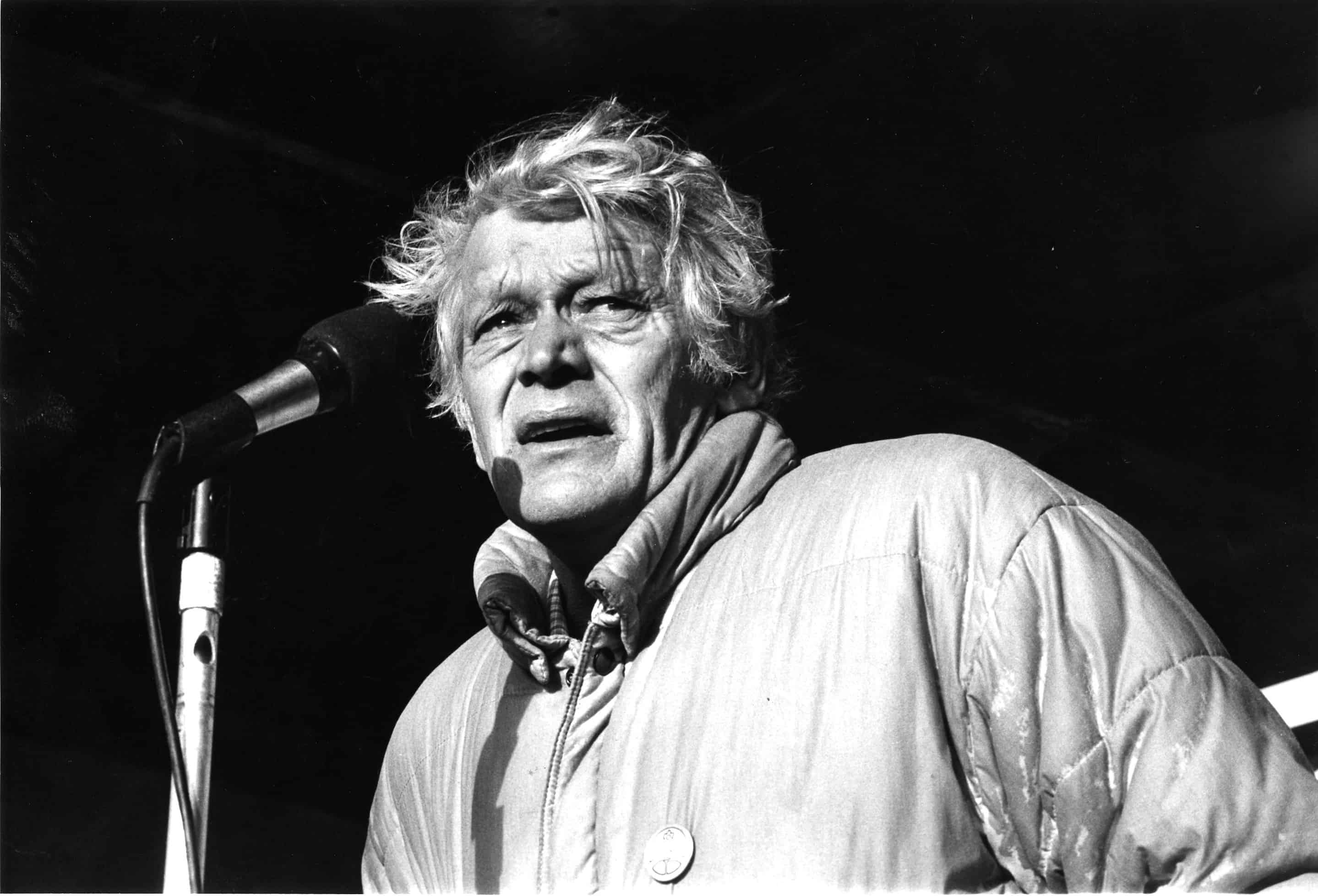
E.P. Thompson, short for Edward Palmer Thompson, was a renowned British historian, writer, and activist whose contributions have shaped the fields of history, sociology, and political thought. Born in 1924, Thompson rose to prominence with his groundbreaking work on the history of the English working class, challenging traditional narratives of history and giving voice to marginalized communities.
In this article, we will delve into 19 extraordinary facts about E.P. Thompson, shedding light on his impressive life and intellectual journey. From his influential works such as “The Making of the English Working Class” to his political activism and tireless fight for social justice, Thompson’s legacy is one that continues to inspire scholars, activists, and anyone interested in understanding the intricacies of the past and shaping a better future. So, let’s dive into the remarkable life of E.P. Thompson and discover the man behind the ideas that continue to resonate with us today.
Key Takeaways:
- E.P. Thompson was a passionate historian who reshaped the study of social history, championed the working class, and advocated for peace and equality, leaving a lasting impact on the field of history.
- His eloquent writing, dedication to social justice, and belief in historical empathy continue to inspire scholars and activists, encouraging a deeper understanding of history and a commitment to creating a more inclusive society.
E.P. Thompson was a renowned British historian and social critic.
E.P. Thompson, born Edward Palmer Thompson in 1924, was an influential figure in the field of social history. His extensive body of work focused on exploring class relations, labor movements, and the importance of individuals in shaping historical events.
Thompson authored the seminal book, “The Making of the English Working Class.”
“The Making of the English Working Class” is considered Thompson’s masterpiece. Published in 1963, the book revolutionized the study of social history by placing working-class interests and agency at the forefront of the narrative.
He was a prominent member of the Communist Party of Great Britain.
Throughout his life, Thompson remained politically engaged and was actively involved in various leftist organizations. He joined the Communist Party of Great Britain in 1942 and later became a vocal critic of the authoritarian aspects of communist regimes.
Thompson was a founding member of the New Left Review.
In 1960, Thompson co-founded the New Left Review, an influential journal that sought to provide a platform for critical analysis and debate on left-wing politics and culture. The publication played a significant role in shaping intellectual discourse during the 1960s and beyond.
He was a prominent anti-nuclear activist.
Thompson was deeply concerned about the nuclear arms race during the Cold War era. He actively campaigned against nuclear weapons and was involved in various peace movements, advocating for disarmament and international cooperation.
Thompson famously criticized the concept of “objective history.”
Challenging the prevailing notion of an unbiased and purely factual historical narrative, Thompson argued that history was inherently subjective and influenced by the perspectives and biases of its writers. He emphasized the importance of understanding history from the standpoint of those who experienced it.
His work had a significant impact on the field of labor history.
E.P. Thompson’s scholarship on labor history helped to reshape the discipline, bringing attention to the experiences and struggles of working-class people throughout history. His emphasis on the agency of individuals within larger social structures was groundbreaking.
He was a prominent supporter of the Campaign for Nuclear Disarmament.
Thompson actively campaigned for nuclear disarmament as part of the Campaign for Nuclear Disarmament (CND). He participated in protests and rallies, calling for the abolition of nuclear weapons and promoting peaceful resolutions to conflicts.
Thompson taught at various universities around the world.
Throughout his career, Thompson held teaching positions at prestigious institutions including the University of Leeds, the University of Warwick, and the University of Toronto. He shared his passion for history and social justice with generations of students.
His work challenged traditional historical narratives.
Thompson’s approach to history challenged conventional perspectives and narratives that excluded the experiences and voices of marginalized groups. He brought attention to the working class, women, and other underrepresented populations, revealing their contributions and struggles.
Thompson’s writing style was known for its eloquence and passion.
His captivating writing style combined rigorous historical analysis with eloquent prose. Thompson’s ability to convey complex ideas in a compelling manner made his work accessible to a wide audience beyond academia.
He was involved in the anti-war movement during the Vietnam War.
Thompson was a vocal critic of the Vietnam War and actively participated in anti-war demonstrations. He condemned the U.S. government’s military intervention and highlighted the devastating impact of the war on Vietnamese civilians.
Thompson was awarded the Order of the Companions of Honour.
In recognition of his contributions to history and social justice, Thompson was awarded the Order of the Companions of Honour by Queen Elizabeth II in This prestigious honor underscored the significance of his work.
He was a dedicated advocate of historical literacy.
Thompson believed in the importance of historical literacy as a means to empower individuals and foster critical thinking. He argued that understanding history was essential for a democratic society.
Thompson’s work influenced generations of historians.
E.P. Thompson’s groundbreaking contributions to the field of social history had a profound impact on subsequent generations of historians. Many scholars continue to draw inspiration from his methodologies and approaches.
He was a proponent of historical empathy.
Thompson emphasized the importance of historical empathy, urging historians to understand and empathize with the experiences and perspectives of those they study. He believed that this approach would lead to a more nuanced and inclusive understanding of history.
Thompson’s writings extended beyond academia.
While Thompson was primarily known as an academic, his writings also reached a broader audience through articles, speeches, and public lectures. He sought to engage the public in conversations about history, politics, and social change.
He was committed to social justice and equality.
Throughout his life, Thompson was actively involved in social justice movements, consistently advocating for equality and human rights. He believed in the transformative power of collective action to effect meaningful change.
Thompson’s legacy continues to inspire scholars today.
The intellectual legacy of E.P. Thompson lives on, inspiring historians, activists, and scholars to challenge dominant narratives, delve into the complexities of history, and strive for a more just and inclusive society.
Conclusion
In conclusion, E.P. Thompson was undoubtedly a remarkable figure in history. His contributions to the fields of history, politics, and social justice have left a lasting impact. From his groundbreaking work on the history of the British working class to his pioneering efforts in writing social history, Thompson revolutionized our understanding of the past. Furthermore, his commitment to activism and his unwavering belief in the power of the people to bring about change continue to inspire scholars and activists around the world. Whether it was challenging the dominant narratives or reaffirming the agency of ordinary individuals, Thompson’s ideas and writings have made a significant difference. As we continue to explore the intricate complexities of human history, E.P. Thompson’s legacy will undoubtedly guide and inspire generations to come.
FAQs
Q: What are some of E.P. Thompson’s notable works?
A: E.P. Thompson is best known for his influential works such as “The Making of the English Working Class,” “Whigs and Hunters: The Origin of the Black Act,” and “The Poverty of Theory and Other Essays.” These works have had a profound impact on the fields of history and sociology.
Q: What was E.P. Thompson’s contribution to social history?
A: E.P. Thompson played a pivotal role in reshaping the field of history by championing social history. He emphasized the importance of studying the lives of ordinary people, their agency, and the social structures that shaped their experiences. Thompson’s approach challenged traditional historical narratives that focused predominantly on elite figures and events.
Q: How did E.P. Thompson advocate for social justice?
A: E.P. Thompson was a staunch advocate for social justice throughout his life. He actively engaged in political activism and was vocal about issues such as worker’s rights, nuclear disarmament, and anti-imperialism. Thompson believed in the power of collective action and the ability of ordinary people to bring about meaningful change in society.
Q: What is the significance of E.P. Thompson’s work on the British working class?
A: E.P. Thompson’s seminal work, “The Making of the English Working Class,” challenged prevailing assumptions about the working class and their historical agency. By highlighting the struggles, achievements, and contributions of working-class individuals, Thompson reshaped our understanding of class dynamics and the role of working-class movements in shaping history.
Q: How does E.P. Thompson’s work continue to inspire researchers and activists today?
A: E.P. Thompson’s commitment to social justice and his emphasis on the agency of ordinary people continue to resonate with researchers and activists today. His writings and ideas have influenced fields beyond history, inspiring scholars in sociology, cultural studies, and political science. Furthermore, Thompson’s belief in the power of collective action serves as a reminder that change is possible when people come together to fight for a more just and equitable society.
Immerse yourself in captivating tales from Britain's past, uncover the intriguing world of social history, and explore thought-provoking narratives that shed light on class struggle. From the epic story of Kynren to the groundbreaking work of Natalie Zemon Davis, these articles offer a fascinating journey through time. Don't miss the chance to delve into the gritty realism of Blue Collar, a movie that exposes the challenges faced by working-class Americans. Each piece promises to engage, educate, and leave you wanting more.
Was this page helpful?
Our commitment to delivering trustworthy and engaging content is at the heart of what we do. Each fact on our site is contributed by real users like you, bringing a wealth of diverse insights and information. To ensure the highest standards of accuracy and reliability, our dedicated editors meticulously review each submission. This process guarantees that the facts we share are not only fascinating but also credible. Trust in our commitment to quality and authenticity as you explore and learn with us.


